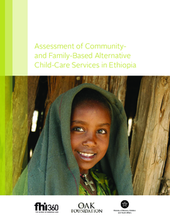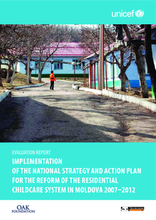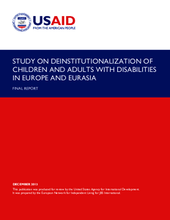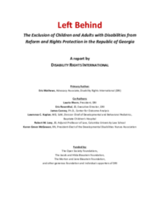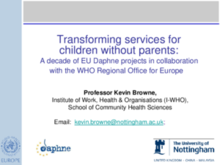Displaying 421 - 430 of 662
This article closes a special edition focused on the state of child protection in 16 countries chosen to represent very different cultural contexts, historical backgrounds, and social welfare systems with special attention to out-of-home care placements, principally family foster care and residential care, though several aspects related to adoption were included as well.
This assessment conducted by FHI 360, with support from Ethiopia's Ministry of Women, Youth and Children Affairs (MoWYCA) and the OAK Foundation aimed to generate evidence about formal community and family- based alternative child care services and service providing agencies in Ethiopia, with a particular focus on magnitude, quality and quality-assurance mechanisms.
This video by Save the Children highlights the major reforms ongoing in Georgia to end harmful child institutionalisation and the work of its project to support the Government in this reform process.
This book by Dr. Xiaoyuan Shang and Karen Fisher provides a comprehensive and clear picture of the situation of children who are orphaned or abandoned in China. It introduces the context and framework for the alternative care system and China’s welfare system as it applies to children, and provides a profile of orphans and of care arrangements, describing both the formal child welfare system and the informal care system, particularly kinship care.
The Government of the Republic of Moldova launched its childcare reforms in 2006 aiming to establish a network of community social assistants, develop family support services and alternative family placement services, and reorganise residential childcare institutions. This evaluation reviews the implementation of the National Strategy and Action Plan for the Reform of the Residential Childcare System 2007–2012 approved by the Government of the Republic of Moldova in July 2007.
Drawing on existing peer-reviewed and grey literature, this article provides an overview of the major components of care reform in Ghana, including reintegration with the extended family, foster care and adoption. In addition, the article discusses the prospects and challenges involved in achieving the reform's intended component.
This report from USAID, prepared by the European Network on Independent Living, features the findings from a study on why little progress has been made to end the institutionalization of people with disabilities in Eastern Europe and Eurasia.
This hard-hitting report by Disability Rights International is the product of a 3-year investigation into the orphanages, adult social care homes and other institutions that house children and adults with disabilities in the Republic of Georgia. It finds that although the Government of Georgia has undertaken an ambitious child care reform process over the last decade, institutionalized children with disabilities were largely excluded from this reform process.
This presentation to the 2012 Sofia Conference by Brankica Janković, State Secretary, Ministry of Labor, Employment, and Social Policy, introduces the achievements and challenges faced in altering the attitude of professionals working with children with disabilities from preferring institutions to family-based care systems.
This presentation to the 2012 Sofia Conference by Kevin Browne, Institute of Work, Health, and Organizations (I-WHO), School of Community Health Services at the University of Nottingham, introduces the collective findings of his research studies on the harmful effects of institutionalization of young children and major causes of child abandonment in Europe and prevention methods.

